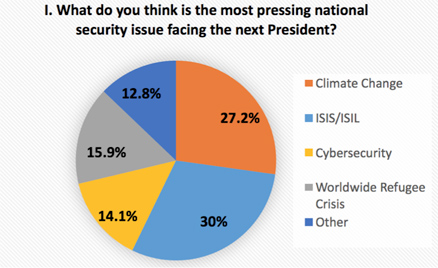Millennial Caucus: national security threats facing country
 Millennial Caucus, February 2016
Millennial Caucus, February 2016
In a February poll, undergraduate students at the University of Virginia cited ISIS/ISIL as the greatest national security threat facing the United States. However, this view was far from unanimous, with issues such as climate change and cybersecurity also high priorities. Specific to ISIS/ISIL, the students also disagreed on how to best handle the issue.
Students offered varied explanations for the why the Islamic state must be viewed as a national security priority.
One cited the organization as the “most immediate and direct threat” to American interests while another thought that ISIS would “become unstoppable” or require extreme military intervention in the near future if left unchecked.
The second major strain of responses focused on regional implications. A student remarked that as many as eight countries could become destabilized as a result of ISIS. A second said that “defeating ISIS is an important step towards ending the Syrian Civil War.”
Yet despite the widespread concern, just 12.8 percent of UVA undergraduates thought that the next president should commit ground troops to combat the terrorist organization. Most (76.1 percent) would like to pursue alternatives first.

Put succinctly by one student, “I think that while it might become necessary, we should exhaust other resources before we exhaust human lives.”
This contrasts sharply with a December NBC News/Wall Street Journal poll that found that 42 percent of Americans would like to see both airstrikes and combat troops committed to a war on ISIS.
In the 2016 presidential campaign, Hillary Clinton’s website describes a plan that is largely in line with prevailing views across Grounds:
Hillary’s plan calls for taking out ISIS’s stronghold in Iraq and Syria by intensifying the current air campaign, stepping up support for local forces on the ground, and pursuing a diplomatic strategy to resolve Syria’s civil war and Iraq’s sectarian conflict between Sunnis and Shias—both of which have contributed to the rise of ISIS.
It’s harder to gauge where her Republican opponent stands. In the past, Donald Trump has promised to commit as many as 30,000 soldiers overseas. However, he was vague on the subject in his April “America First” foreign policy speech:
And then there’s ISIS. I have a simple message for them. Their days are numbered. I won’t tell them where, and I won’t tell them how. We must as a nation be more unpredictable. We are totally predictable. We tell everything. We’re sending troops. We tell them. We’re sending something else. We have a news conference. We have to be unpredictable. And we have to be unpredictable starting now.
The UVA student poll was also notable for its diversity of opinion. While ISIS led in perceived national security threats, it only garnered 30 percent of the total. Climate change followed closely at 27.2 percent.
One respondent defended this viewpoint, stating that “[a ruined Earth] has the potential to affect the entire world and future much more dramatically than other international issues. It has the potential to create much more devastating conflicts and be unsolvable if ignored.”
Put more succinctly by a second, “If there is no planet, there are no other issues.”
Climate change is the “most divisive national security issue between Republicans and Democrats” according to the PEW Research Center. About three-quarters of Democrats see it as a major threat while just one-quarter of Republicans do.
Of the UVA undergraduates polled, 83.1 percent of them identified as leaning left or independent. Thus the high number associated with climate change is not a surprising outcome.
The presidential candidates' opinions about climate change fall in line with what voters might expect.
Bernie Sanders has staunchly maintained that climate change is our greatest national security threat. Secretary Clinton has not been as strong with her language, but she has promised to uphold recent international agreements that lower carbon emissions while cutting back on oil consumption. In contrast, Mr. Trump has described climate change as a “hoax.”
Cybersecurity and the worldwide refugee crisis placed a close third and fourth in the poll.
The candidates will be heavily courting the coveted 18-29 demographic between now and Election Day. Based on evidence from Grounds, young voters will be looking for an expansive national security discussion to help inform their vote.
This article was written with the help and support of our Advisory Council: Brett Curtis, Lauren Horne, Charles Hershman, Anna Wickham, Jay Boyd, Francesca Callicotte, and Jonathan Jackson.
The Millennial Caucus is a student-led initiative that promotes the views of undergraduate students from the University of Virginia on the topics covered by the Miller Center’s First Year 2017 project . This survey was conducted in February 2016 and had a 14 percent response rate and + 5 margin of error. For more about this project, please visit About the Millennial Caucus.